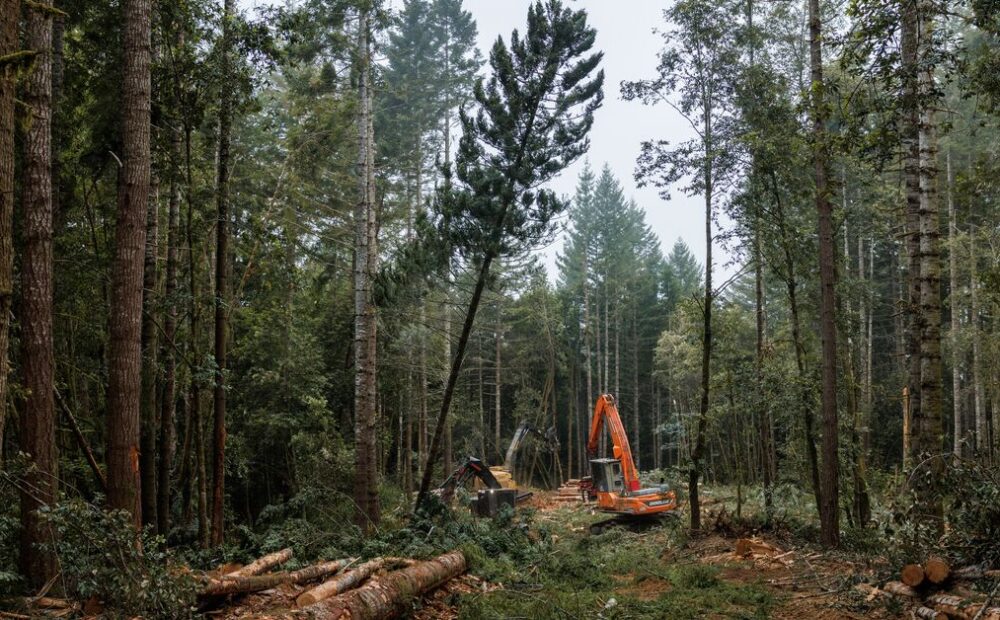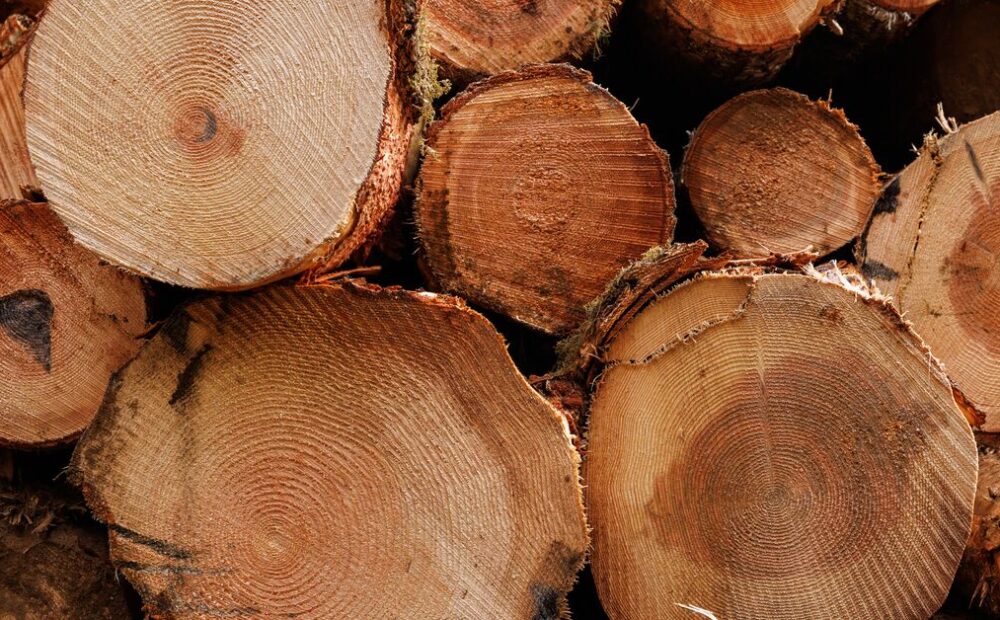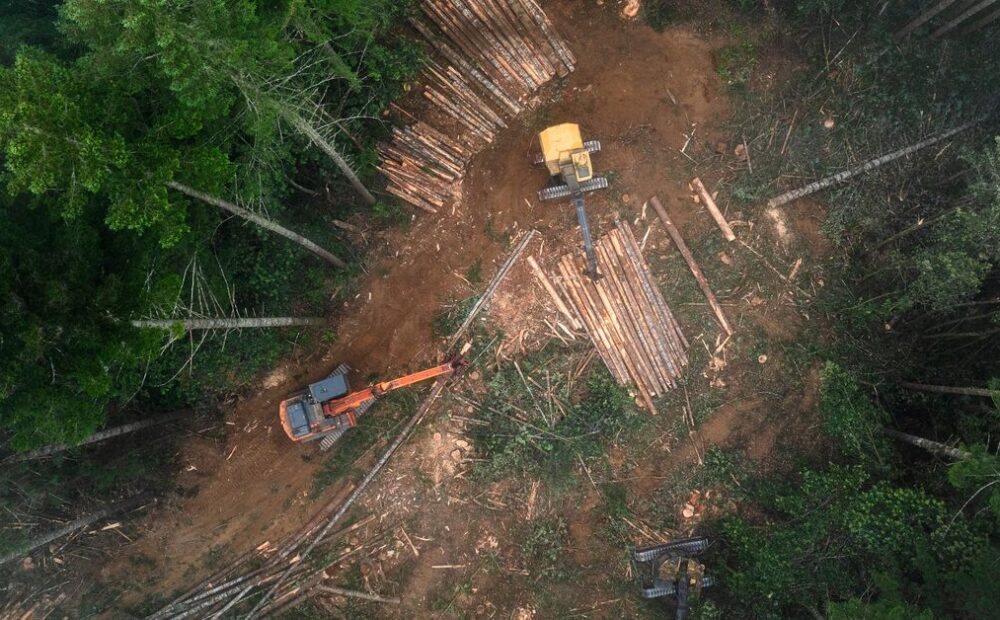Jake Morris was eight years old when he started riding along with his father to work in Northern California, learning the logging trade under towering canopies of coast redwood, Douglas fir, and tan oak trees.
Growing up on the North Coast, tucked in a valley about 15 miles northeast of Eureka, Jake and his family were steeped in Humboldt County’s tradition of logging and lumber work that stretches back to the mid-1800s.
Jake’s grandfather worked as a logger in nearby Willow Creek during the logging boom of the 1950s, when hundreds of Humboldt County sawmills powered the local economy. He moved the family up to British Columbia in 1957 and then returned to California to get involved in land deals.
After recruiting his son, Steve, to go into business together, the father-and-son team started Morris Logging in 1974. Nine years later, Steve struck out on his own and launched the current version of Morris Logging & Contracting.
“We started as contractor loggers, and times were tough, and we were just getting started out,” said Steve. “We did the best we could and started a family. When my first son was born, I really realized why we were put here, and all my energy went into providing for my family. Logging was the industry that I knew, and so we kept doing that.”
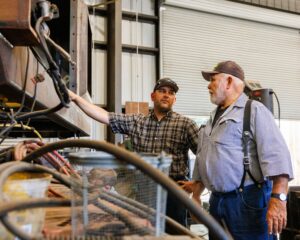 Today, his son Jake is president of Morris Logging, while Steve serves as the company’s managing partner. Jake represents the family’s latest generation in the logging industry, a role that he has embraced with enthusiasm.
Today, his son Jake is president of Morris Logging, while Steve serves as the company’s managing partner. Jake represents the family’s latest generation in the logging industry, a role that he has embraced with enthusiasm.
“I always try to think of a better way to do what we do,” said Jake. “You don’t always make the best decision, but sitting here today, I think we’ve made more right decisions than wrong. Being a diversified operation in our area is huge for the cash flow side of the business and keeping your employees working year-round. We are also very fortunate to have probably the best crew we’ve ever had.”
Building a diversified logging business on the North Coast
While Morris Logging originally focused on logging before transitioning into in-woods chipping for pulp and paper, Jake said the business has diversified substantially over the years. Today, the family’s businesses handle logging, trucking, a wholesale landscape materials yard, wood grinding, clean woodchip production, and green waste processing.
Even as the logging and timber industries have consolidated, North Coast family-owned operations like Morris Logging are finding new ways to make a living through ingenuity and careful planning.
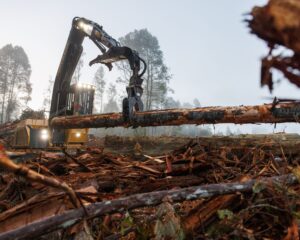 The company’s grinders process wood waste into hog fuel, a product that is burned for fuel or used as mulch. After processing wood waste into fuel, Morris Logging delivers the biomass to wood-fired power plants in Scotia and Anderson.
The company’s grinders process wood waste into hog fuel, a product that is burned for fuel or used as mulch. After processing wood waste into fuel, Morris Logging delivers the biomass to wood-fired power plants in Scotia and Anderson.
Steve Morris gives plenty of credit to his son, Jake, for breathing new life into the business when he came on board. He pointed to Jake’s work ethic and outgoing personality, which has led to closer relationships with fellow loggers and leading timber companies on the North Coast.
“With Jake’s great personality, he has been able to progress the business to where we are today,” said Steve. “He has done a lot of the public relations and getting us involved in organizations like the Redwood Region Logging Conference. We have a good relationship with Green Diamond and Humboldt Redwood Company, which are the two largest landowners here.”
Modern logging: precision machines and computer-aided processing
Mention logging to the average American, and it may evoke images of lumberjacks working with saws or mechanized operators cutting through trees like oversized wheat. In reality, a modern operation like Morris Logging is a mechanical marvel, blending advanced mechanical engineering with skilled operators and precision computer systems.
Jake said the company’s day-to-day logging operations begin with the feller buncher, which is key in determining how and where the next steps will unfold.
“If [the given unit] is not felled correctly, you end up fighting it and it costs you production,” said Jake. “It requires quite a bit of leg work to determine where to start. In the thinning operations that we do for Humboldt Redwood, the first tree you cut is the last one that you log because you’re working your way to the back and cutting your way back out.”
Once a tree is felled, Jake’s team uses skidders to move it to a landing. Next, a processor removes branches, cuts the log to length, and sorts them into decks by length and species for a log loader, a large machine with a grapple that loads the logs onto a truck for hauling.
“The processor is probably one of the biggest innovations in our industry,” said Jake. “The number of logs that it processes every day is probably equivalent to the work of eight guys with chainsaws on the ground. [The processor] measures the length and the diameter of each cut, while the operator is sitting in the machine with a full-size computer screen in the corner of his cab. The computer gives him the right length of each cut for the mill.”
 Technology advances in the industry have meant less labor is needed to get the job done, a major efficiency gain for businesses like Morris Logging. At the same time, mechanized logging has made it easier to sezxlectively harvest trees and more carefully mitigate environmental impacts than in the past.
Technology advances in the industry have meant less labor is needed to get the job done, a major efficiency gain for businesses like Morris Logging. At the same time, mechanized logging has made it easier to sezxlectively harvest trees and more carefully mitigate environmental impacts than in the past.
Embracing change is part of the Morris family’s approach to keeping the business healthy for the long term. Jake said working closely with his dad built a deep bond and prepared him to launch the next chapter in the family business. Looking ahead, Jake said he hopes to one day pass along the business to his son.
“It’s been really rewarding to be able to get up and go to work with my dad every day,” said Jake. “I know we had our growing pains, but after 18 years working with him every day, we can really reflect on what we have done together. It gives me something to look forward to with my son coming up. I look at what me and my dad have, and it’s kind of a perfect blueprint of what I would like to have with [my son] one day.”

